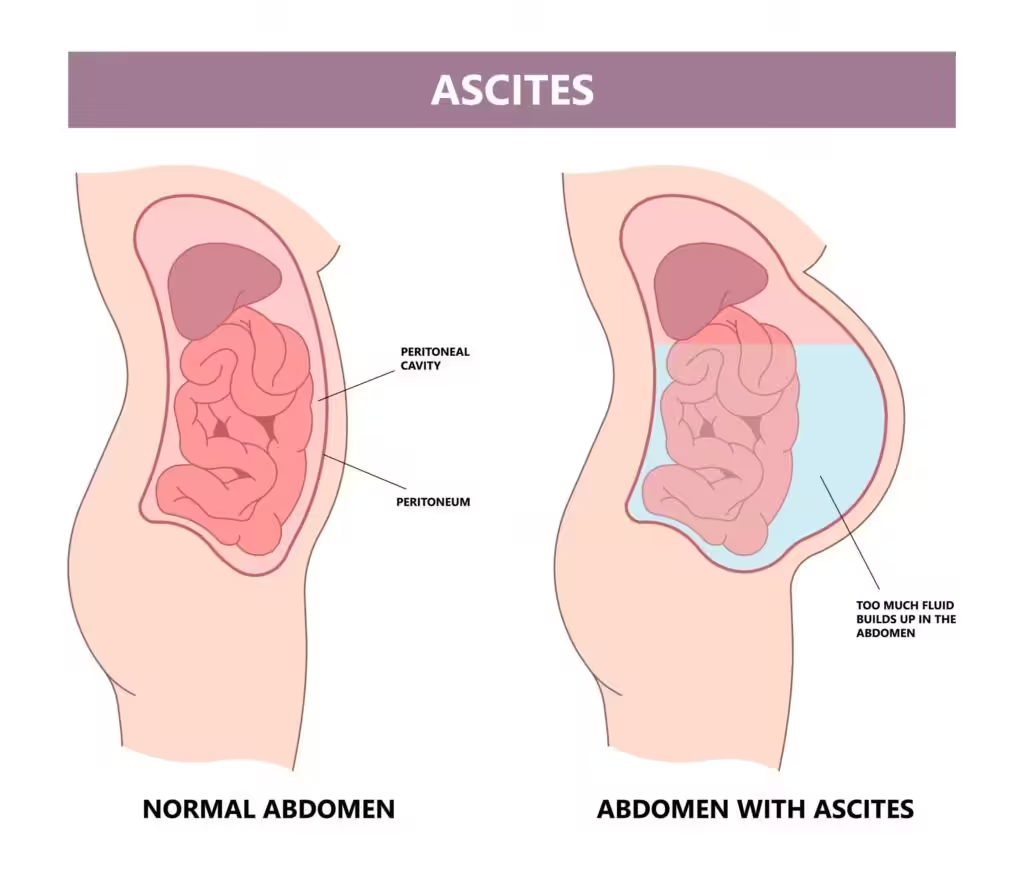Ascites is a condition that can be caused by excessive alcohol consumption, leading to significant liver issues, such as ascites causes due to cirrhosis, which may become serious and life-threatening.
Inside the abdomen, there is a membrane called the peritoneum. The peritoneum has two layers. One of those layers lines the tummy wall, while the other layer covers the organs.
The peritoneum generates ascitic fluid, acting as a lubricant between the two layers, allowing the organs to move smoothly without friction.
Ascites are when the fluid builds up between the two layers.
Can Alcohol Cause Ascites?
Yes. If you are an alcoholic or you abuse alcohol regularly, then you may develop ascites from cirrhosis of the liver. Between 10 to 20 per cent of heavy drinkers develop cirrhosis, typically after 10 or more years of drinking.
However, the symptoms of liver cirrhosis can be extreme, and any sign of these symptoms will require immediate medical attention.
So, it is handy to recognise the early signs due to the seriousness of the liver disease and its progression.
Signs and symptoms of ascites –
If you feel that you have ascites, then you will likely be experiencing rapid weight gain and an expanding abdomen. Other potential signs and symptoms include:
- Shortness of breath
- Swollen ankles or feet
- Bloating and loss of appetite
- Indigestion
- Constipation
- Difficulty sitting down
- Fatigue and low energy
- Back pain
Ascites build up excessive fluid in the gut; therefore, you may experience painful sensations from the increased pressure on your abdominal organs.
Other symptoms may include nausea or general difficulty functioning normally daily, as sitting and moving become increasingly uncomfortable.
Can Ascites be Treated?
There is no cure for ascites, but there are ways to help make you more comfortable and prevent further health complications.
The approach of any treatment plan for ascites is determined by what caused it in the first place. However, there are general treatment options available that can still help you.
One of those treatments is dietary-based. For example, reducing the symptoms of ascites is possible by lowering your sodium intake.
Ascites are a complication that comes from cirrhosis of the liver. If you are drinking heavily and have been for a while, then it is vital to watch for any potential signs and symptoms.
One of the most important steps is to stop drinking alcohol. This will stop the damage and allow your liver to heal.
Here are the symptoms that are associated with cirrhosis –
- Easily bruised
- Loss of muscle tone (atrophy)
- Weight loss
- Loss of appetite
- Low energy
- Jaundice (yellowing of eyes and skin)
- Bleeding inside the mouth
- Vomiting blood
- Patches of red on palms (erythema)
- Feeling confused, poor concentration and memory loss
- Swollen legs (oedema) and abdomen (ascites)
- Dark urine
- Feverish
- Build up of fluid
If you have a history of alcoholism and any of the above symptoms, our alcohol counsellors can advise and refer you to a detox doctor or alcohol rehab centre.
Will Ascites Go Away if I Stop Drinking?
It does depend on how much the liver has been damaged. If you have stopped drinking, your liver function will improve, and your ascites may resolve, but it is not certain.
If you currently have ascites, it is a sign that your liver is struggling to function due to long-term damage from alcohol.
It is difficult to say how much water retention will last if you stop drinking. If you don’t stop drinking, the water retention will last as long as you.
If left untreated, ascites can be a significant contributor to your death. The survival rate five years after diagnosis is around 30-40%.
The faster you can get treatment for your alcohol addiction, the more chance your liver has to regenerate its ability to function, but it will never be as strong as it once was.
What Else Can Cause Ascites?
Ascites can be a symptom of various cancers, but other conditions, such as advanced liver disease and heart failure, can also cause it.
Ascites can develop when:
- Cancerous cells can inflame the stomach’s lining, resulting in an abnormal fluid build-up.
- Lymph nodes in the gut become blocked, and the body cannot drain fluid properly.
- Liver cancer raises the pressure in blood vessels nearby, forcing fluid out.
- The body suffers from liver damage and cannot produce enough blood proteins, resulting in fluid leaking from the veins into the stomach.
Are Ascites the Same as Cirrhosis?
Ascites are not the same as cirrhosis. Instead, ascites are a complication that forms from cirrhosis. Ascites are the most common difficulty that arises from late-stage liver disease.
Treating Ascites Caused by Alcoholism
If you have ascites caused by liver cirrhosis, it is vital to address the cause of your cirrhosis, which is heavy alcohol use. Acknowledging this is the first step of treatment.
The good news is that plenty of comprehensive and compassionate care centres, local or further afield, specialise in alcohol treatment.
Any rehab recommended by our team is a certified and professional treatment centre that uses the 12 Steps model and evidence-based therapies that help you uncover and examine the root causes of your addiction.
Any treatment you receive in rehab is based on your needs so that the program can tackle your unique struggles, conditions, and medical history.
Rehabs will also encourage exercise and a healthy diet to coincide with your other treatments, along with an assigned therapist working with you throughout your stay. In addition, your therapist will conduct one-on-one therapy sessions to go towards your aftercare plan.
If you have developed ascites from alcoholic liver cirrhosis, managing your liver health is the most important thing.
References
https://www.bapen.org.uk/members/pdfs/conf_presentations/2012/09.30-10.05-Hamlin.pdf Nutritional Assessment and Macronutrient Deficiencies in Liver Disease
https://www.ncbi.nlm.nih.gov/pmc/articles/PMC1860002/
https://www.bsg.org.uk/wp-content/uploads/2020/10/gutjnl-2020-321790.full_.pdf Guidelines on the management of ascites in cirrhosis

Fiona Kennedy is an editor and content manager who earned her Master of Arts degree from the University of Edinburgh, followed by completing the CELTA Cambridge teaching course in English. She has worked as an editor, writer and personal coach. Coming from a family deeply involved in the rehabilitation and support of those suffering from addiction, she is passionate about helping people to understand and take control of their dependences. Fiona’s other passions include travelling and taking part in community projects.


